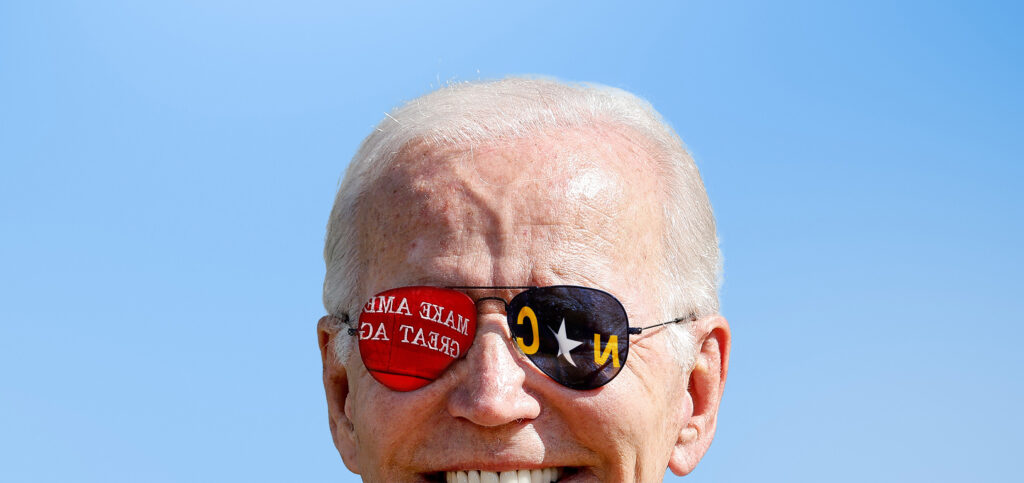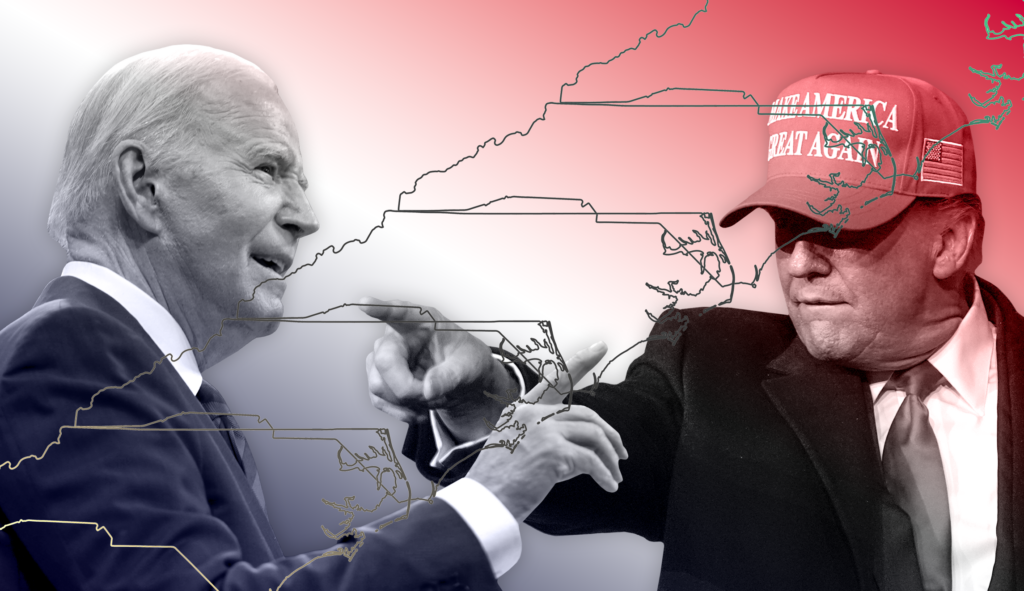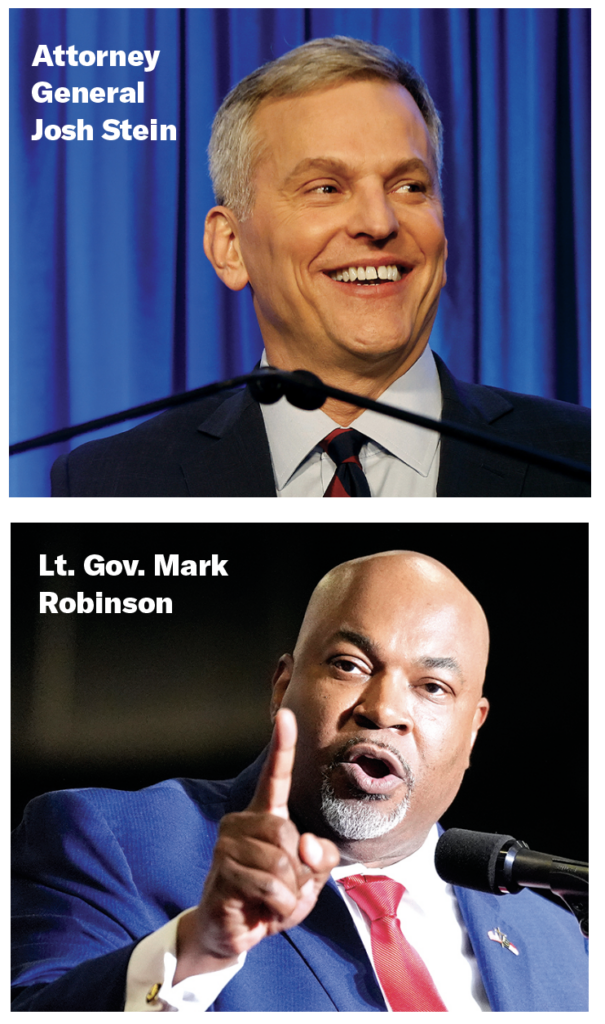
President Joe Biden’s reelection campaign efforts at expanding the 2024 election playing field begin with the rolling hills of North Carolina.
The state has been just out of grasp for Democrats since the anomaly of 2008, when Barack Obama clinched victory by less than half a percentage point in his White House win over GOP rival John McCain. Outside of that, Republican presidential candidates haven’t lost North Carolina since Democrat Jimmy Carter of Georgia, a fellow Southerner, prevailed in 1976.
But with changing demographics, a slate of controversial Republican down-ballot candidates, and an early ground game set up, the Biden team is betting this is the year the purple state turns blue.

North Carolina and its 16 Electoral College votes is an insurance policy for the Biden campaign. Winning there would provide political breathing room if it comes up short in one or more currently “must-win” states, such as Michigan, Pennsylvania, and Wisconsin. Donald Trump famously won that trio in 2016, putting him over the magic 270-electoral vote mark in one of the biggest political upsets of the modern political era. But then Trump saw the “blue wall” get rebuilt in 2020 when Biden won Michigan, Pennsylvania, and Wisconsin while also claiming the longtime red states of Arizona and Georgia.
The 2024 Biden campaign has been making historic early and significant investments in North Carolina, which went to Trump by a margin of 1.3 points in 2020, down from the 3 points former Secretary of State Hillary Clinton lost to Trump by in 2016. This year, analysts expect it to be tighter — possibly the closest race of the swing states.
“This is the key battleground this cycle,” Kian Sadjadi, executive director of the North Carolina Democratic Party, told the Washington Examiner. “Looking at the information that’s coming back from the field and from voters out in the community, we really do feel like we are going to do it this cycle.”
North Carolina gives Democrats hope for a few reasons. One regularly cited by politicos is the demographic shifts, which favor Democrats. It’s not shocking that the population is decreasing in rural counties (Republican strongholds) and increasing in urban centers and suburbs (Democratic hotbeds). North Carolinians are concentrating. Two years ago, half the state’s population lived in 20 counties out of 100 in the state. Now that’s down to 10. The growth of these areas is so drastic that both Raleigh and Charlotte routinely make lists of the top 10 growing metro regions in the country.
Democratic hurdles remain
Still, it’s not as simple as Democrat versus Republican in North Carolina, according to Thomas Mills, a political blogger and commentator in the Tar Heel State. The state has a history of voting independently of its conservative characterization and voting in opposition to registration trends. The number of registered Democrats has shrunk, while Republicans’ numbers have grown.
At the same time, Democrats, and specifically the Biden reelection team based in Wilmington, Delaware, have reasons for optimism. North Carolina has seen a huge influx of people moving from Democratic-run states such as California and New York. Democrats have also won nine of the past 12 gubernatorial races in North Carolina. Further, though Obama’s 2008 North Carolina win was the last for a Democratic presidential candidate, subsequent races have been close — miles away from the 10-plus-point victories Republicans enjoyed in 2000 and 2004 with George W. Bush heading the GOP ticket.
“Registration numbers don’t mean as much as they did at one time,” Mills said. “You’re better to look at demographics.”

Given this, analysts are hesitant about placing North Carolina firmly in Republican grips. Another ray of light for the Biden camp is the tendency for the state to revert to centrist candidates in statewide elections. This cycle, Republicans have possibly shot themselves in the foot by putting forward “very extreme” candidates, starting with the GOP gubernatorial nominee, Lt. Gov. Mark Robinson, per Sadjadi.
“There’s a lot of evidence that just hatred, fear, dislike of the other party really gets people to the polls,” said Steven Greene, professor of political science at North Carolina State University. “In that sense, Mark Robinson, to some degree, is potentially the best boon there could be for Democratic turnout in North Carolina.”
In the gubernatorial race, Robinson is up against Attorney General Josh Stein in what may become the most expensive state race in the country. Stein, a career politician endorsed by the current governor, is a possibly much more appealing candidate than Robinson, who, as a pastor, has leaned into offensive conspiracy theories about Michelle Obama being a man, called homosexuality “filth,” and said the transgender movement is “demonic.”

Further down the ballot, even the most pessimistic Democrats were shocked by the Republicans’ candidate for superintendent of public instruction. Michele Morrow has supported applying the death penalty to prominent Democrats, at one point tweeting she would like to see Barack Obama executed by firing squad. She has also called public schools “indoctrination centers” and urged parents not to send their children there.
Morrow beat state Superintendent Catherine Truitt for the GOP nomination in the March 5 Republican primary. Morrow will face Mo Green, a longtime school administrator, who won the Democratic primary.
“There’s got to be a lot of Republicans who are looking at this, going, ‘What in the world did we just do?’” Mills said. “[Republicans] nominated a bunch of people who are not really competent people.”
On the other side of the ballot, the Democratic Party has been putting in the work. In 2022, Democrats failed to put candidates up in 44 of 170 state legislative races, seemingly exemplifying lackluster interest in the state. This year, there will be Democratic candidates in all but two of those 44 races.
For party officials, that investment is expected to go far.
“You don’t just build a relationship with one conversation,” Sadjadi said. “It’s something that takes time to develop. And it takes time to sort of build that trust and get people who might have felt left behind by previous campaigns or previous cycles to sort of come back and to feel like they really are part of the team with us.”
A long-term, well-funded campaign is how Democrats plan to build on their momentum. A Biden campaign source told the Washington Examiner that staffing started six months earlier than in 2020, with the opening of 10 campaign offices across the state, in addition to the Raleigh headquarters. The campaign is investing more money into the state by “a significant degree,” according to Sadjadi, and North Carolina was included in the Biden campaign’s battleground state ad buy, which totaled $25 million. It is targeting black and Hispanic media, educating young students on voter ID laws, and sending staffers to geographically diverse locations, and it has already seen positive feedback, according to Sadjadi.
Building a ground campaign is nothing without attention from the head honchos, though, so the president himself has visited to show his personal focus on the Tar Heel State.
“We’ve been getting consistent visits by the president, the vice president, the first lady, the second gentleman,” Sadjadi said. “They’re spending their time and resources coming to the state, making sure that we are on the map.”
Republicans still like their chances
Lackluster fundraising and a busy court schedule have kept Trump from matching Biden’s head start — his campaign has yet to set up a ground game in the battleground state. However, his ability to turn out Republican voters in the last two elections should give supporters of the former president hope. Trump was able to drive 81% of registered Republicans to the polls in 2020. That’s a record “nobody had ever seen,” according to Mills.
Biden’s team is hoping Trump’s “burn it down” mentality has alienated enough Republicans to dampen turnout. However, North Carolina State University’s Greene said his appeal shouldn’t be underestimated.
“Trump is Trump,” Greene said. “What he is able to do as a candidate, his strengths, his weaknesses, what he can say and get away with that other candidates have never been able to, is very different.”
CLICK HERE TO READ MORE FROM THE WASHINGTON EXAMINER
If the Biden camp manages to tame the red tide in North Carolina, Democrats are hopeful for success overall in the general. Trump’s road to victory, Sadjadi said, goes right through the state, and they want to stop him there.
“If Biden is winning North Carolina, it’s probably a good year for Biden, which I think a lot of people are writing off but still remains very much a possibility,” Greene said. “Maybe not the most likely, but certainly a possibility.”





